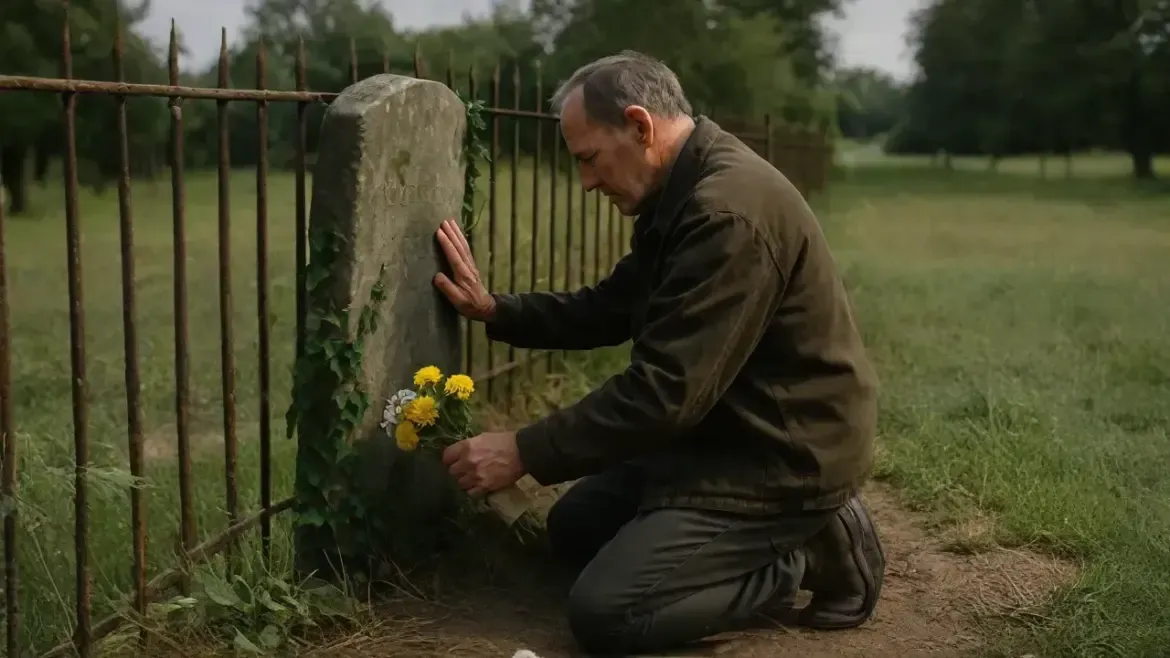My name. My silence. My decision to vanish instead of collect honors that belong to ghosts, not men.
You’ve been off the grid a long time, the scarred Marine said, flipping to a document stamped confidential, deferred honors. We’d like to change that. With your permission.
I almost laughed. I didn’t do anything but sit on some grass. The tall one leaned forward, voice like gravel.
You sat beside a fallen Marine for ten years. That’s more than some do for the living. I didn’t know what to say, so I said nothing.
We sat there in the soft hum of my kitchen fan, the old clock ticking like a metronome on memory. Finally, the scarred one stood. There’s a ceremony, he said.
We’d like you to be there. For Moore. For yourself.
I watched them go, boots clicking gently down my front stets, their card disappearing without a sound. And when I turned back inside, when I saw that file still sitting open on the table, with that black and white photo of a young man’s hand resting on my shoulder like it never left, I did something I hadn’t done in years. I saluted.
Not to the men. Not to the flack. But to the memory that somehow made it home.
I didn’t expect the bagpipes. Didn’t expect the line of Marines in dress blues stretching down the hill like sentinels carved from silence. Didn’t expect the riderless horse or the rifle team or the goddamn drone camera circling like some vulture trying to make legacy digestible in 4K.
But they told me to wear my jacket, the old one with the torn cuff and the buttons I’d sewn back myself in 73, and to meet them just past sunrise at Hillcrest National. I almost didn’t go. I sat in the truck for ten whole minutes watching fog roll over the dew-soaked grass, wondering if Moore would’ve laughed at the whole thing.
But when I stepped out and felt the weight of the morning settle across my shoulders, I knew this wasn’t about me. They’d cleaned the grave. Leveled it.
Polished it. Re-engraved the name. James M. Moore, 1st LT, USMC, 1944-1968.
Never forgotten. A fresh flag flew beside it, tucked in tight, and a wreath sat like a crown made of memory and apology. But what broke me wasn’t any of that.
It was the envelope, sitting on top of the headstone, sealed with wax, my own handwriting staring back at me. You’re not forgotten. Not this week.
One of the officers, a full bird colonel this time, handed it to me and said, we recovered this during restoration. Thought you should have it back. I didn’t open it.
I didn’t need to. I knew what it said. I’d written versions of that same letter for ten years.
A decade of guilt and quiet Sundays. A decade of telling a dead man I was sorry for not dragging him out of that blast zone. For making it to the chopper when he didn’t.
For surviving when someone else didn’t get the choice. But now there were people standing around who had never even met Moore. Recruits.
Officers. Local high school kids holding flags they barely knew how to fold. And somehow, they all looked at that grave like it was sacred.
A general I’d only seen once, back in 71 when he visited Da Nang, stepped forward and offered me a salute so crisp it felt like it sliced the wind. Mr. Navarro, he said, Lt. Moore’s final citation will list you as the custodian of record.
Your flowers were proof of continued honors under Title X. This is your ceremony too. I wanted to tell him no, that I didn’t want a headline. Didn’t want my name printed in gold or spoken over a loudspeaker.
But the moment I opened my mouth, something else happened. A young man in civilian clothes walked up, maybe 20, nervous and stiff backed. He had a cane, cheap aluminum, not military issue, and a patch on his shoulder that said ROTC.
Sir, he said, voice cracking, my dad served with Lt. Moore. He, he said if I ever got the chance to thank the man who remembered him.
He didn’t finish the sentence. He just handed me a small, folded paper. Inside was a photo I’d never seen.
Me and Moore, sitting on sandbags, grinning with our boots off, socks drying in the sun. The kind of moment the war tries to erase but never fully can. I didn’t even know this picture existed.

